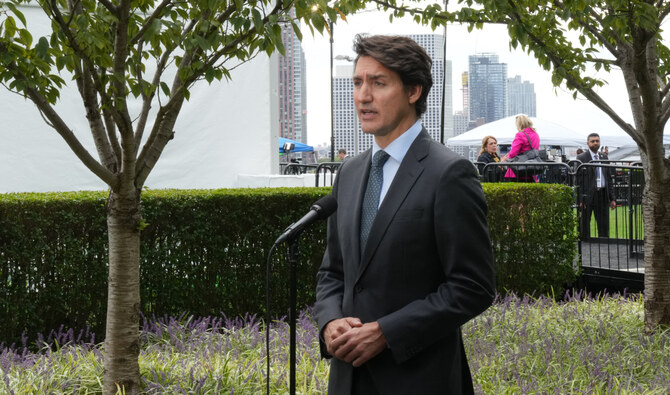OTTAWA: Canadian Prime Minister Justin Trudeau on Wednesday survived a vote of no confidence in the first major test of his minority Liberal government whose popularity has waned after nine years in office.
His tenuous grip on power, however, is already set to face more challenges in the coming days and weeks, with the main opposition Conservatives vowing to try again to topple the government as early as Tuesday.
Following a heated debate that saw members of Parliament trade insults and slam their fists on desks, they voted 211 to 120 against the Conservative motion to unseat the Liberals and force snap elections.
Far ahead in public opinion polls, Tory leader Pierre Poilievre has been itching for a snap election since the leftist New Democratic Party (NDP) earlier this month tore up a coalition agreement with the Liberals, leaving the Trudeau administration vulnerable to being toppled.
A combative Poilievre has railed against Trudeau for what he said was a failure to address soaring costs of living, a housing crisis and crime, while doubling the national debt.
The promise of Canada, “after nine years of Liberal government, is broken,” he said during a Commons debate on Tuesday.
But other opposition parties, whose support is needed to topple the Liberals, have pushed back against his rightwing agenda.
Liberal House leader Karina Gould accused the Tories of “playing games.”
“I think it’s pretty lame that they’re going to put forward another non-confidence vote tomorrow,” she said.
Immediately following the no confidence vote, the NDP again sided with the Liberals to pass legislation on capital gains taxes, averting another political crisis.
Poilievre has vowed to keep trying, with the next opportunity to bring down the government to be presented next week. If that fails, he will have a few more chances before the end of the year.
The separatist Bloc Quebecois has also demanded concessions from the ruling Liberals for its continued support in Parliament beyond the end of October.
Trudeau swept to power in 2015, and has managed to hold on by defeating two of Poilievre’s predecessors in 2019 and 2021 ballots.
The deal with the New Democratic Party to prop up the Liberals would have kept his government in office until late 2025.
But the NDP, seeing its alignment with the Liberals hurting its own popularity, exited the deal early.
According to a recent Angus Reid poll, the Conservatives are well ahead of the Liberals, with 43 percent of voting intention against 21 percent for the ruling party. The NDP is at 19 percent.
Going forward, NDP leader Jagmeet Singh said his party would evaluate each bill in Parliament before deciding how to vote.
With legislation pending on NDP priorities including a national dental plan, political analysts who spoke to AFP suggested an election won’t likely be triggered until at least spring 2025.
However, University of Ottawa professor Genevieve Tellier told AFP: “Anything is possible. It could come before Christmas.”
In the meantime, a weakened Trudeau administration under constant threat “will find it more difficult to govern,” she said.
Bloc leader Yves-Francois Blanchette said Wednesday he would seek to keep the government afloat until the end of October.
But if there has been no movement on its legislative priorities by then, he said the Bloc would turn against the Liberals.
In Canada’s Westminster parliamentary system, a ruling party must hold the confidence of the House of Commons, which means maintaining support from a majority of members.
The Liberals currently have 153 seats, versus 119 for the Conservatives, 33 for the Bloc Quebecois, and the NDP 25.


























